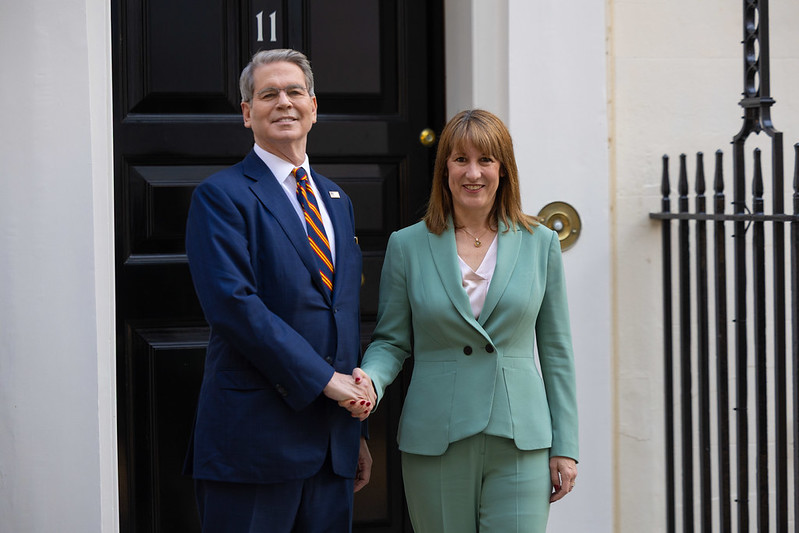A tax deal for US multinationals backed by Chancellor Rachel Reeves could potentially hand US companies a $40 billion annual tax break next year, including around $6 billion for US tech giants, according to new analysis from TaxWatch.
The UK Treasury is now refusing to say whether it calculated the cost in foregone tax revenues before the UK backed the US-led deal.
The findings come as the Chancellor prepares an Autumn Budget expected to announce tax increases and spending cuts in response to a growing fiscal shortfall.
On 28 June, the Chancellor and other finance ministers from the G7 group of countries (Canada, France, Germany, Italy, Japan, the UK and the US) unilaterally announced that in response to US threats of tax and tariff penalties, US-headquartered multinationals would be exempted from two of the three international ‘Pillar 2’ taxes. These 15 percent global ‘top-up’ taxes for the largest multinationals were agreed in an unprecedented 2021 international agreement brokered by the OECD between over 130 countries, including the US and the UK. They are due to enter into force this year.
These internationally-coordinated minimum taxes are intended to tackle “tax challenges arising from the digitisation of the economy” – the ability of multinational companies to provide digital services around the world without a taxable business presence in the countries where their users are based, and to move ownership and accompanying profits of intangible assets into tax havens.
UK politicians from all parties had previously welcomed these ‘Pillar 2’ taxes: when in opposition, then-Shadow Chancellor Rachel Reeves called the 2021 agreement “first moves towards a global pact on tax avoidance“, and criticised the previous government for not pushing for a higher 21 percent rate.
The G7 announced in June that US-headed companies will be exempted from two of the three taxes making up the Pillar 2 system. The announcement was ostensibly made without consultation or agreement with the other 130+ countries in the agreement. Several major non-G7 countries are now reportedly pushing back, and the OECD is scrambling to get other countries to agree to re-write the rules by the 31 December deadline set by the United States.
US tax experts suggest that the US carve-out, long demanded by US industry lobbyists, will overwhelmingly benefit companies whose profits rest heavily on intangible assets or online services – notably big tech firms and the pharma sector.
Crucially, neither the UK nor any other G7 government has publicly disclosed any estimates of the scale of the tax revenues signed away by the Pillar 2 carve-out.
While in opposition, Chancellor Rachel Reeves previously claimed that raising the Pillar 2 minimum tax from 15 to 21 percent “would have brought £131m extra a week to Britain for our NHS and other public services, while also stopping our high streets being aggressively undercut.”
In response to a Freedom of Information request from TaxWatch, the Treasury has confirmed that internal impact estimates of the June 2025 deal exist, but declined to release them. It also refused to say whether these estimates were produced before or after the UK agreed the deal, citing the need to preserve “a safe space for policymaking” and to avoid “prejudicing international relations”.
Revenue authorities in the UK and other G7 countries will have access to unpublished ‘Country by Country Reports’ (CBCR) from large multinationals which disclose where the firms book profits and pay taxes. These will allow a much more accurate estimate of the likely impact of the G7 carve out than is possible from aggregate statistics. Large multinational companies operating in the EU will soon be required to publish such reports too, but research by the Fair Tax Foundation has found that the required cross-border data was produced by fewer than half of the US-headed firms which published CBCR reports early this year under an implementing law passed in Romania.
Since neither the UK government nor US multinationals will disclose the information needed to determine the likely scale of the international tax break that the UK has agreed, TaxWatch has produced an approximate ‘ball park’ estimate to inform debate. We have used data published by the OECD on US-headed corporate groups’ aggregate profits and taxes in more than 100 countries; as well as company financial documents from major US tech multinationals.
TaxWatch makes no suggestion that any of these firms are avoiding or evading tax, or are otherwise responsible for any wrongdoing.
We estimate that under the G7 ‘carve out’, US multinationals could be exempted from around $40.5 billion of ‘top up’ taxes annually by 2026. Using the proportion of US firms’ foreign revenues and profits accounted for by Big Tech firms, we estimate that for this small group of firms alone, the G7 exemption could be worth around $6 billion a year by 2026 – approximately 11% of these tech firms’ total non-US tax bills.
This is a global estimate: without country-by-country reporting at firm level it is difficult to determine how the top-up taxes would be allocated between different jurisdictions, or by individual corporate groups. TaxWatch welcomes comments and critiques of the methodology or the data.
The government is also expected to announce a review of the UK’s Digital Services Tax (DST) in the Budget this month, amid renewed US pressure to scrap it. Retiring the DST now would forego £2.8 – £3.5 billion in future tax revenue between 2026 and 2029, according to previous TaxWatch analysis.
Full details of TaxWatch’s analysis of the G7 tax deal are available here, as well as responses from three of the Big Tech firms.
Taxpayers and decision-makers deserve more accurate information than ball-park estimates from aggregate data. International tax deals are too often done and dusted prior to parliamentary approval; and without the detailed, published costings and cost-benefit analyses that are standard practice in domestic tax policymaking.
In this case:
- The UK Treasury should release the estimate it has made of UK tax foregone in the G7 deal;
- Other G7 governments should do the same;
- At a minimum, US-headed companies including tech firms should publish full country-by-country financial/tax reports, in line with transparency obligations in the EU countries where they operate.
Image: Chancellor Rachel Reeves and US Treasury Secretary Scott Bessent meet at Downing Street, 15 September 2025 (HM Treasury/Flickr CC BY-NC-ND 4.0)



